Quantum Computing Courses for Universities and K-12 Schools
2025.01.09 · Blog SpinQ media resourcesSpinQ product photosSpinQ blog
Are you browsing Quantum Computing Courses? You're in the right place!
At SpinQ, we've designed a series of tailor-made quantum computing courses that form a comprehensive quantum educational solution. Whether you're an educator aiming to inspire your students or a learner striving to deepen your understanding of quantum computing, our expertly crafted courses and learning resources are here to help you achieve your learning goals.
Let's explore the vast world of quantum computing together!
Quantum Computing Courses for University: Empowering Quantum Education and Talent Development
1. Who This Quantum Computing Course Is For:
This course is designed for undergraduates with a background in university-level physics or those majoring in quantum information, who wish to learn quantum computing.
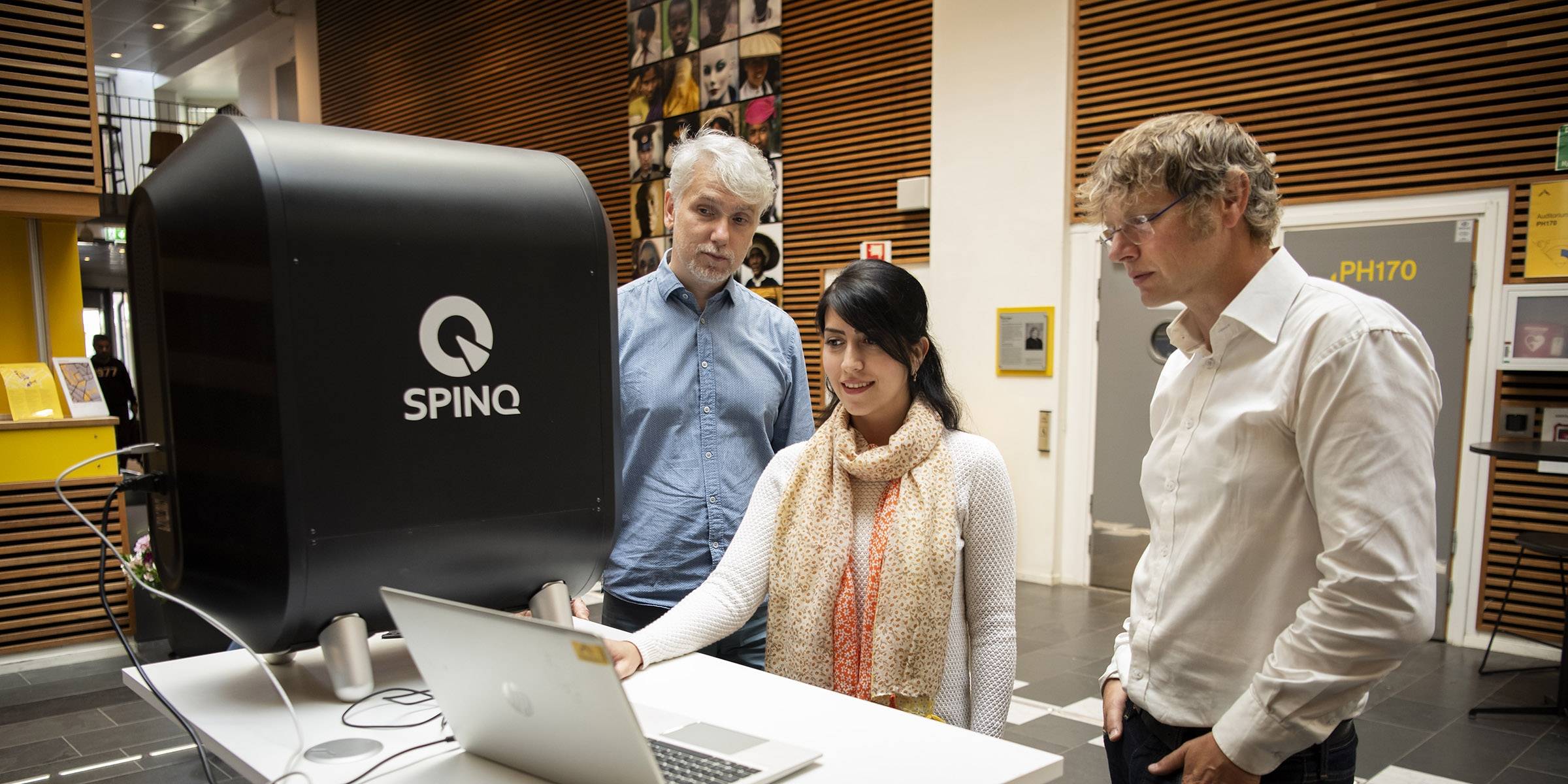
2. Brief Introduction to University Quantum Computing Course
By integrating quantum learning devices (education-grade quantum computers) and quantum information into university physics labs, or offering dedicated quantum computing courses, undergraduates can gain hands-on experience with cutting-edge quantum information, quantum computing, and experimental techniques.
The goal is to foster a multidimensional understanding of quantum computing while enhancing students' engineering skills, preparing them to excel in this rapidly evolving field.
3. What Will You Learn in Our University Quantum Computing Courses?
University Quantum Computing Theory Course
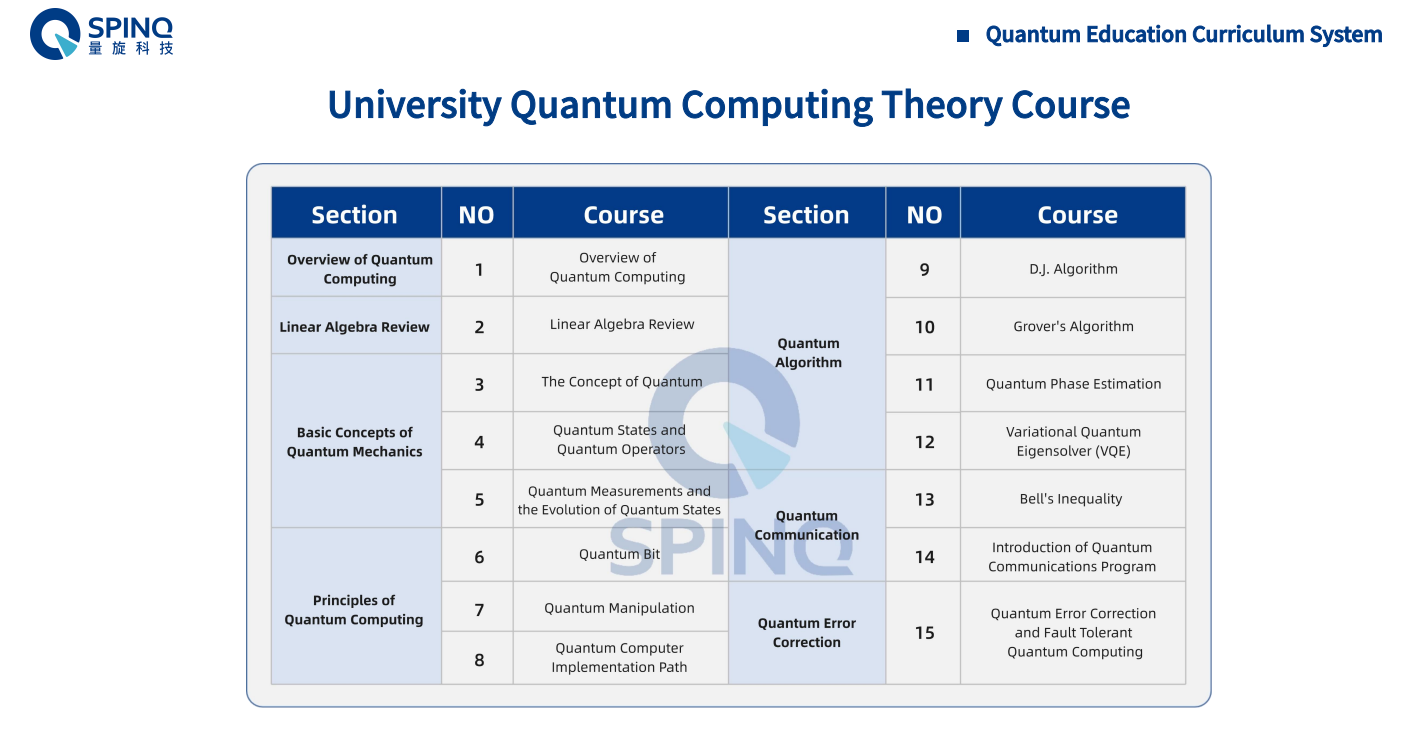
Section 1: Overview of Quantum Computing
Section 2: Linear Algebra Review
Section 3: Basic Concepts of Quantum Mechanics
The Concept of Quantum
Quantum States and Quantum Operators
Quantum Measurements and the Evolution of Quantum States
Section 4: Principles of Quantum Computing
Quantum Bit
Quantum Manipulation
Quantum Computer Implementation Path
Section 5: Quantum Algorithm
D.J. Algorithm
Grover's Algorithm
Quantum Phase Estimation
Variational Quantum Eigensolver (VQE)
Section 6: Quantum Communication
Bell's Inequality
Introduction of Quantum Communications Program
Section 7: Quantum Error
Quantum Error Correction
Fault-Tolerant Quantum Computing
University Quantum Computing Experimental Course
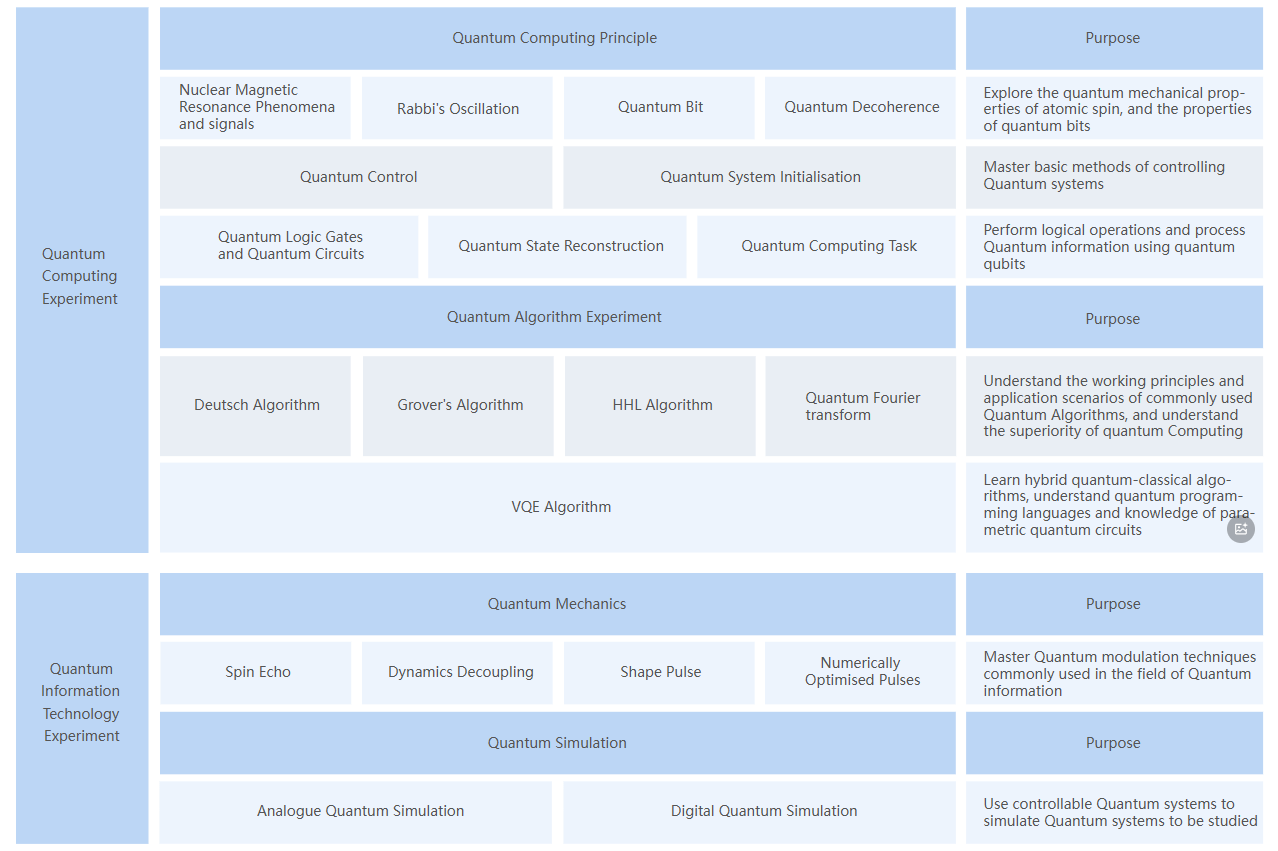
Section 1: Quantum Computing Principle
Nuclear Magnetic Resonance Phenomena and Signals
Rabbi's Oscillation
Quantum Bit
Quantum Decoherence
Course Purpose:
Explore the quantum mechanical properties of atomic spin and the characteristics of quantum bits (qubits).
Master the fundamental methods for controlling quantum systems.
Perform logical operations and process quantum information using quantum qubits.
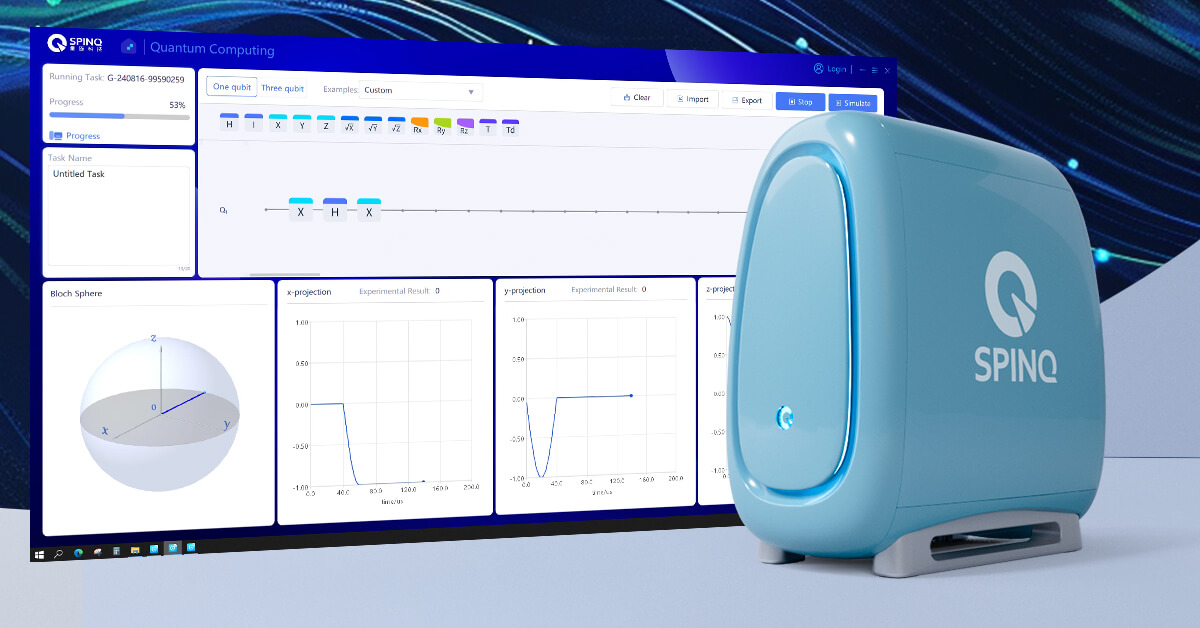
Section 2: Quantum Algorithm Experiment
Deutsch Algorithm
Grover's Algorithm
HHL Algorithm
Quantum Fourier transform
VQE Algorithm
Course Purpose:
Understand the working principles and application scenarios of commonly used quantum algorithms, as well as the advantages of quantum computing.
Learn hybrid quantum-classical algorithms, gain knowledge of quantum programming languages, and explore parametric quantum circuits.
Section 3: Quantum Mechanics
Spin Echo
Dynamics Decoupling
Shape Pulse
Numerically Optimised Pulses
Course Purpose:
Master Quantum modulation techniques commonly used in the field of Quantum information.
Section 4: Quantum Mechanics
Analogue Quantum Simulation
Digital Quantum Simulation
Course Purpose:
Use controllable quantum systems to simulate the quantum systems under study.
Explore all our quantum computing courses in detail and find the perfect fit for your quantum learning journey!
4. Key Skills You'll Gain from Our University Quantum Computing Courses
1. Deepen Your Foundational Knowledge of Quantum Computing:
Combine theory with hands-on experiments to thoroughly understand the core principles and technical frameworks of quantum technology, while building a strong foundation in quantum computing.
2. Cultivate Practical Hands-On Skills:
Experimental courses outline clear objectives, procedures, and phenomena, helping students grasp quantum computing principles while developing practical skills and scientific thinking.
3. Foster Innovative Thinking:
Offering a customizable platform for quantum experimentation, these courses encourage both students and instructors to engage in technical innovation, quantum algorithm development, and model exploration, enhancing research capabilities.
4. Prepare for Future Employment:
A blend of quantum theory and practice helps students build a comprehensive quantum knowledge system, equipping them for future job opportunities in the quantum computing field.
Quantum Computing Courses for K-12: Engaging and Easy Ways to Learn Quantum Concepts
1. Who This Quantum Computing Course Is For:
This course is designed for high school students with a basic understanding of set theory and vectors, eager to explore quantum computing.

2. Brief Introduction to K-12 Quantum Computing Course
With tailored quantum learning tools and quantum courses, students are introduced to fundamental quantum mechanics concepts, the basics of quantum computing, linear algebra essentials, quantum algorithm design, and introductory quantum programming.
These topics are presented in an engaging and accessible way, sparking students' interest in the world of quantum technology.
3. What Will You Learn in Our K-12 Quantum Computing Courses?
K-12 Quantum Computing Theory Course
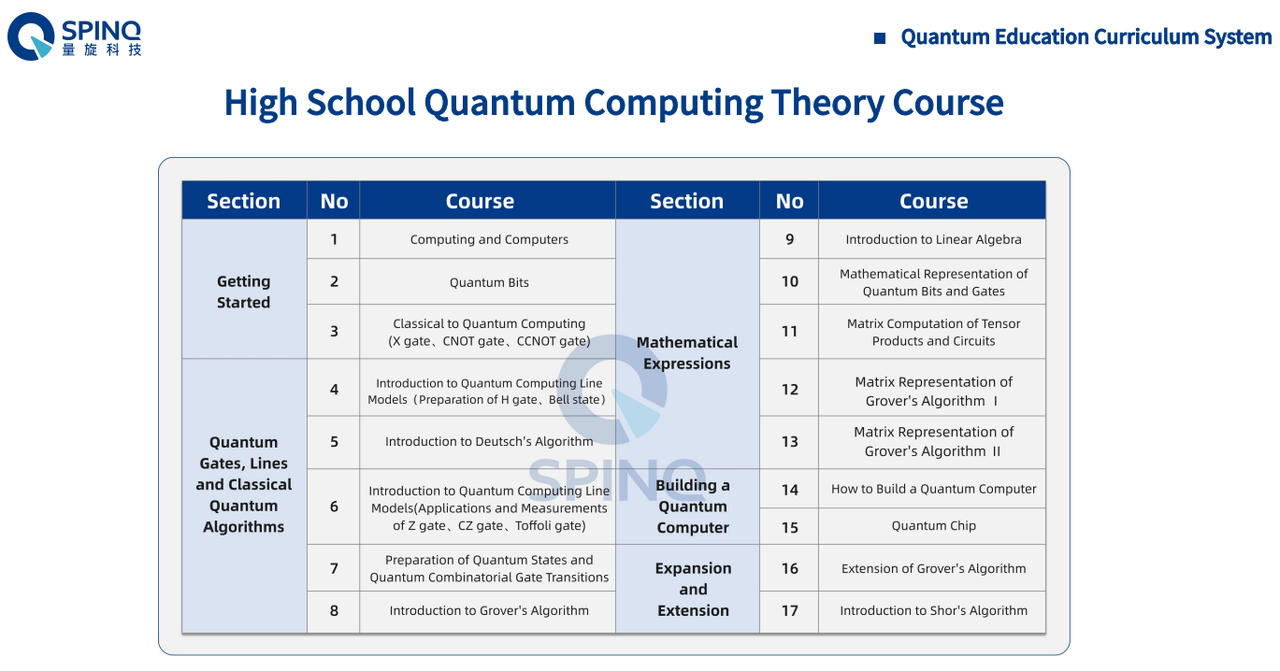
Section 1: Getting Started
Quantum Computing and Quantum Computers
Quantum Bits
Classical to Quantum Computing (X gate、CNOT gate、CCNOT gate)
Section 2: Quantum Gates, Lines, and Classical Quantum Algorithms
Introduction to Quantum Computing Line Models (Preparation of H gate、Bell state)
Introduction to Deutsch's Algorithm
Introduction to Quantum Computing Line Models (Applications and Measurements of Z gate、CZ gate、Toffoli gate)
Preparation of Quantum States and Quantum Combinatorial Gate Transitions
Introduction to Grover's Algorithm
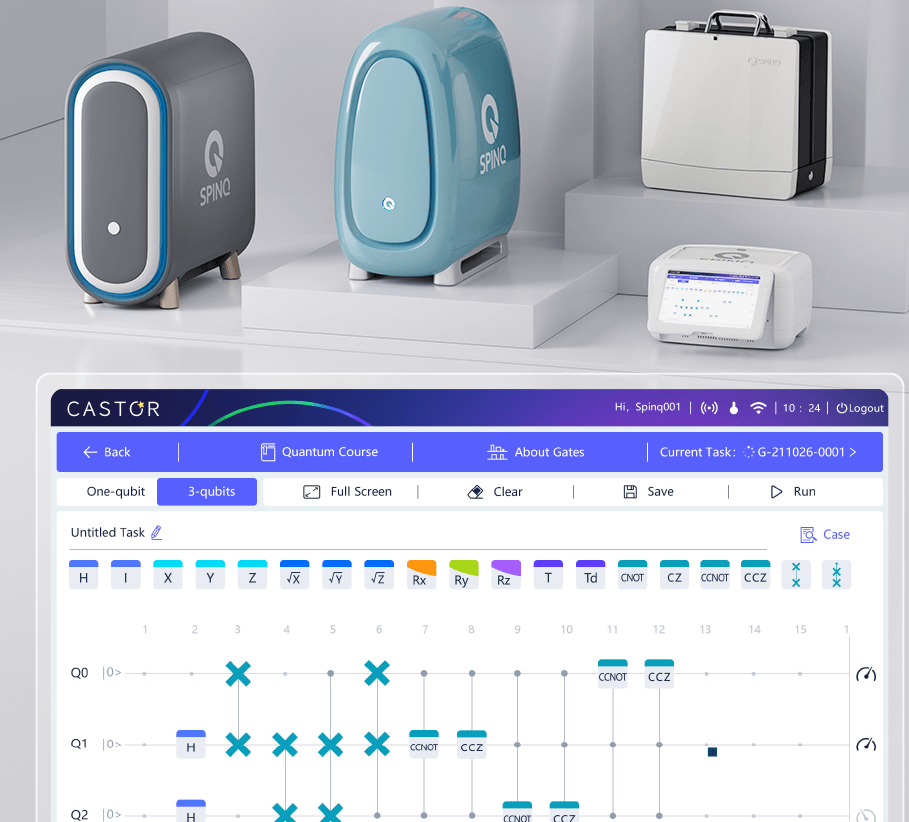
Section 3: Mathematical Expressions
Introduction to Linear Algebra
Mathematical Representation of Quantum Bits and Gates
Matrix Computation of Tensor Products and Circuits
Matrix Representation of Grover's Algorithm I
Matrix Representation of Grover's Algorithm ||
Section 4: Building a Quantum Computer
How to Build a Quantum Computer
Quantum Chip
Section 5: Expansion and Extension
Extension of Grover's Algorithm
Introduction to Shor's Algorithm
4. What You'll Achieve in Our K-12 Quantum Computing Courses
1. Inspire Interest and Curiosity
By clearly explaining the foundational concepts of quantum mechanics and the basic principles of quantum computing, these courses ignite students' curiosity and passion for quantum technology.
2. Cultivate Innovation and Problem-Solving Skills
Each lesson blends quantum theory with hands-on exercises, helping students apply their knowledge in practice while fostering innovative thinking and problem-solving abilities.
3. Develop Scientific Literacy and Critical Thinking
Through the design of quantum algorithms and reflective discussions, students are encouraged to approach problems from multiple perspectives, enhancing their critical thinking skills.
4. Bridge to Higher Education and Future Careers
This curriculum provides both theoretical knowledge and practical skills in quantum computing, preparing students for future academic pursuits and career opportunities in the quantum technology field.
Other Supporting Quantum Teaching and Learning Resources
1. Quantum Teaching and Learning Slides
2. Quantum Experimental Lesson Plans
3. Quantum Teaching and Learning Videos
4. Resources for Quantum Competitions
5. Interactive Quantum Games
6. Quantum Chess and Educational Tools

Learn Quantum Computing Courses with World-Class Quantum Experts
Our interactive quantum computing courses are carefully crafted by experienced quantum computing scientists, engineers, educators, researchers, and industry professionals.
These quantum courses are closely integrated with SpinQ's independently developed quantum computing products, offering comprehensive quantum education services that include fundamental quantum theory, hands-on quantum experiments, and structured quantum course learning.
If you have any questions during the quantum courses, our experts are always available to provide guidance and support.
SpinQ Quantum Computing Courses Trusted by Leading Universities Worldwide
Our quantum computing courses have been embraced by numerous prestigious universities, forming strong collaborations to advance quantum education. These partnerships highlight the trust and recognition our quantum courses have earned for their quality and impact.
Discover why top universities recommend our quantum computing tools and courses as a benchmark for quantum education. Join a growing network of learners and educators shaping the future of quantum computing.
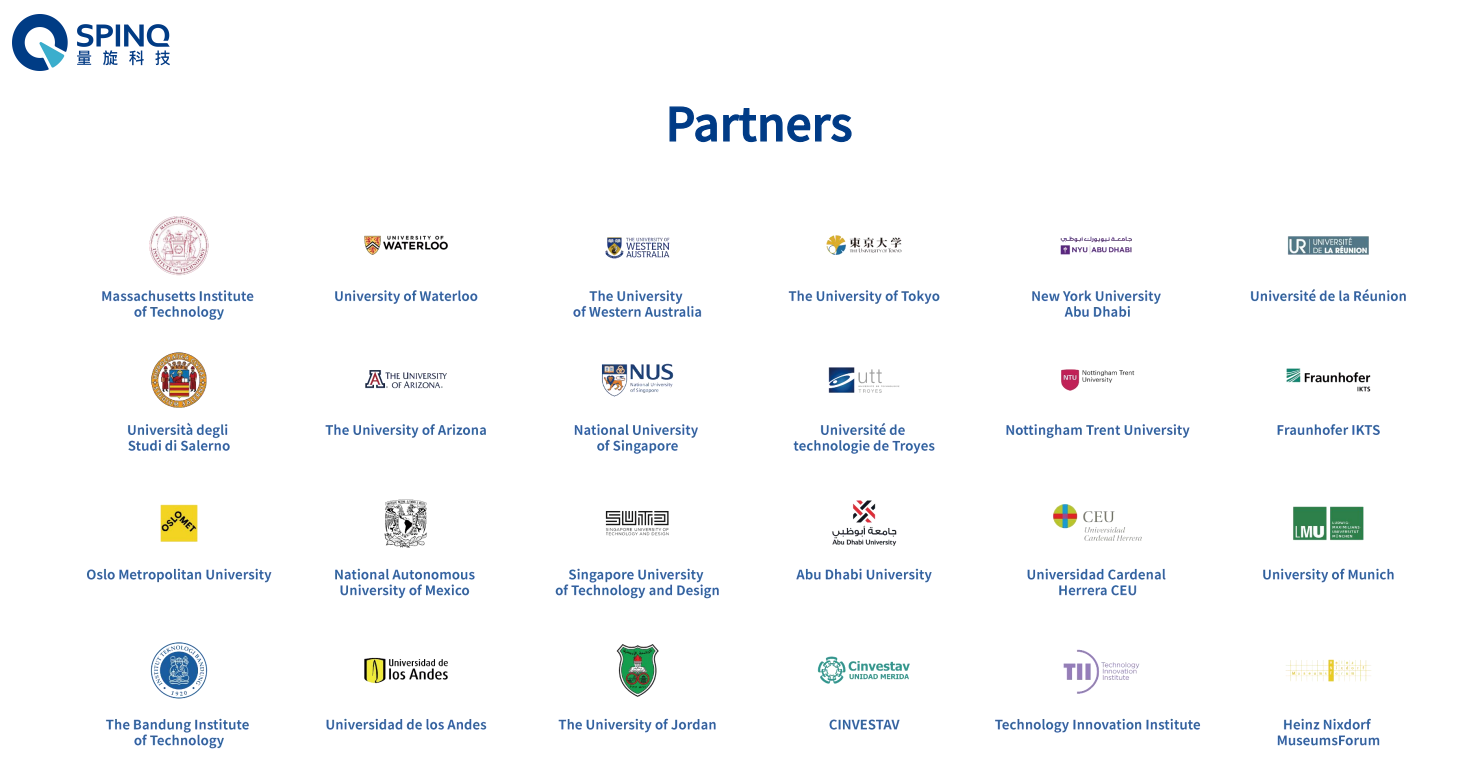
FAQs:
1. Can I learn quantum computing on my own?
Yes, you can start learning quantum computing independently using online quantum courses, quantum learning resources, textbooks, videos, and tutorials, but structured quantum courses can significantly speed up your progress.
2. Is there a course in quantum computing?
Absolutely! Many universities and quantum computing companies like SpinQ, offer comprehensive quantum computing courses tailored to different skill levels.
3. Are there any good intro quantum computing courses?
Yes, SpinQ offers beginner-friendly quantum computing courses available online, designed to teach fundamental quantum concepts and basic applications in quantum computing.
4. Where can I learn quantum computing?
You can learn quantum computing through online platforms, university programs, or specialized quantum computing providers like SpinQ, which offers quantum computing courses integrated with hands-on experiments.
Featured Content






